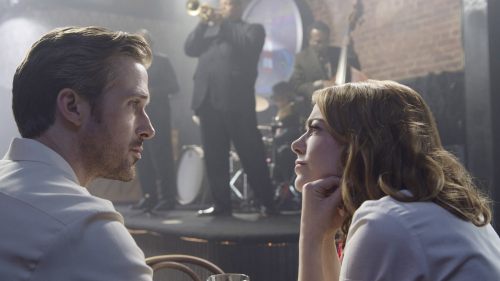LA LA LAND And The New Annual Tradition Of The Pre-Oscar Backlash
I saw La La Land last week, but you wouldn’t know it if you scanned my social media feeds. I’d prefer not to broadcast this fact simply because I’m one of the officious clowns who enjoyed the movie without a hint of irony. I thought it was cute, an opinion that might end up putting me on the receiving end of a wedgie in certain circles. In the time it took me to enter the theater and exit the theater, public opinion on the film had soured. This might be the most rapid re-assessment of a prestige release I can remember. An article on the Huffington Post from December 27 bears the unambiguous title “Let the La La Land Backlash Begin.”
The shelf life of the modern Oscar contender is a curiously short one, full of wild shifts in reputation and esteem in the two-to-three months where people care about such things. Perhaps this is a function of the awards season’s evolution into an active, visible election-style campaign for studios. Film critics and enthusiasts jockey to be the first ones on, and later, the first ones off of a bandwagon. Ever since Paul Haggis’s Crash shocked the industry by swiping the Best Picture Oscar in 2006, then curdled into a running punchline, Academy favorites have received a sideways glance from certain corners of the moviegoing public.
Inevitably, a brave soul writes an impassioned piece about how we all “got it wrong” and need to reevaluate a movie. Usually, I end up agreeing with the sentiments expressed. Yeah, Crash is manipulative, simplistic, and aggravatingly self-righteous. Garden State, while not an awards film, was a critical darling in 2004. Now, the consensus is that it’s a movie written only for people in their early-to-mid 20s and is so beholden to its influences that it’s less a film and more a cinematic equivalent of a fifth-grade book report. Innaritu’s Birdman, like La La Land, took its critical licks well before claiming a boatload of Oscars because of its swaggering sense of its own significance.
What a lot of these films have in common is an unrelenting sincerity that borders on mania. They seek to put a nice, tidy bow on top of life — explaining it away with whimsy, pathos, or maudlin musical touches. They also tend to be nostalgic elegies for some purer form of art or culture. The Artist and La La Land share an obsession with passé cinematic forms — silent film and musicals. Both are unrelenting charm offensives, throwing cute dogs, knowing asides, sweeping romance, and Ryan Gosling at the audience in order to win them over. Birdman stops its narrative dead in its tracks to allow its protagonist, a former A-list actor played by (at the time) former A-list actor Michael Keaton, to rail against technology and the coarsening of entertainment thanks to the internet. Last year’s Best Picture winner, Spotlight, was partially a paean to the good old days of newspapers and swashbuckling reporters, before Fox News and Donald Trump eviscerated the public’s trust in the media.
These self-consciously old fashioned movies can’t help but feel like a trip through your grandmother’s walk-in closet. They rub the viewer’s nose in how precious they are, in the same way that certain people can’t stand a trip to their local Anthropologie clothing store. It’s calculated. It’s inauthentic to its subject matter. In the case of La La Land, its racial politics are questionable. What is that white guy doing telling a black person what jazz is? In an environment filled with toxic discourse, political instability, and widening cultural divides, who really wants to escape to a distant fantasy world that barely resembles our own?
Simply put, people who go to the movies do. This is the very purpose of the medium, to allow the viewer to transport themselves to a more idealized version of reality. The commercial cinema in America thrived during the Great Depression and World War II, with theaters clogged with lavish musicals like Gold Diggers of 1933 and the upper class, liquored up exploits of the Thin Man series. It’s not revelatory to say that movies are an escape mechanism, but it’s worth noting that the way in which we escape in the 21st century is drastically different from the way in which it was done at the dawn of the artform. Audiences go to war in the stars or climb into robot suits and fight crime. We expect our casts to be multi-racial and our male and female leads to be on equal footing. It’s still escapism, even if it looks drastically different than it did 80 years ago.
Those modern entertainments are, in some ways, equally nostalgic, though. The Marvel films are adaptations of characters made popular in the 1960s. The Star Wars films use our memory of the original films as a central selling point. Sequels, prequels, reboots and remakes of Alien, RoboCop, Ghostbusters, Blade Runner, Total Recall, and the like do the same. Nostalgia is America’s primary source of escapism, so why shouldn’t that be reflected in our awards bait?
Ultimately, my experience with La La Land involved a choice to meet it on its own terms — on the surface. It wasn’t until I read the great Amy Nicholson’s review for MTV News that I started to really see the seams of the movie. That’s the power of a great film critic over the slapdash troll pieces that end up leading the popular backlash. A talented critic will always have more to say than “it was annoying” or “it was cute.”
The sugar rush of nostalgia fades eventually, and what’s left with La La Land is a musical where none of the music is particularly memorable and outside of the opening scene, the dancing isn’t much to speak of either. It lives and dies on how charming you find the leads and how open you are to going along for the ride. That might be the most nostalgic thing there is about La La Land — its power rests not with the strength of its intellectual property or the cleverness of its plot, but solely with the charisma of the movie stars cast in the lead roles. The entire system of Hollywood used to function thanks to the astute plugging of famous actors into clichéd situations tailor-made for their personas.
If La La Land ends up sweeping the Oscars, as it seems it might, it will be thanks to that initial sugar rush, which has carried plenty of mediocre-to-decent movies to the Dolby Theater stage. In its wake, there will be scores of aggrieved critics who can’t believe what they’re witnessing. A few years later, we’ll shake our heads in dismay at how this all happened. More than anything else, that’s the oldest, most tired story in Hollywood.



